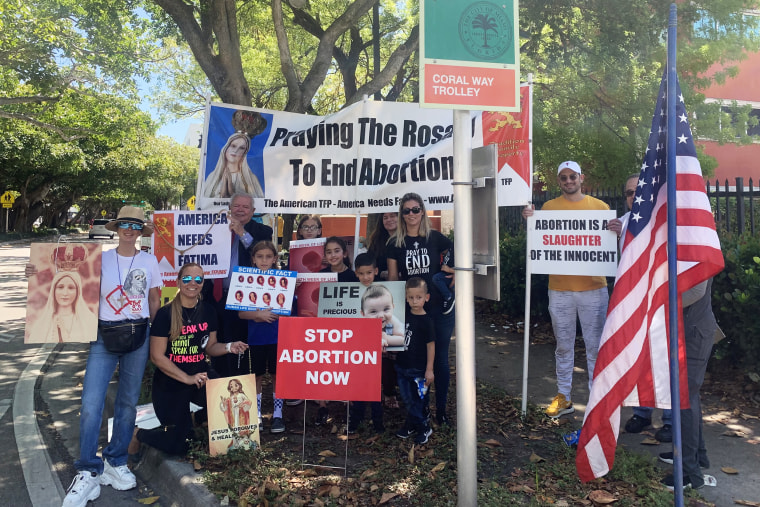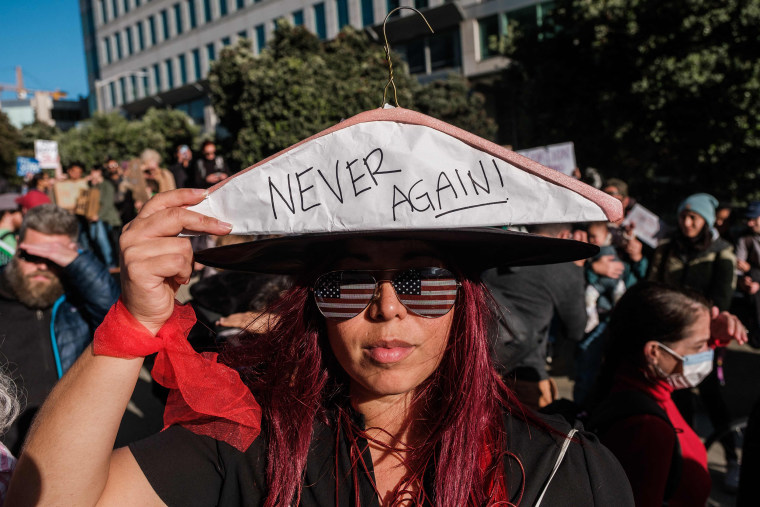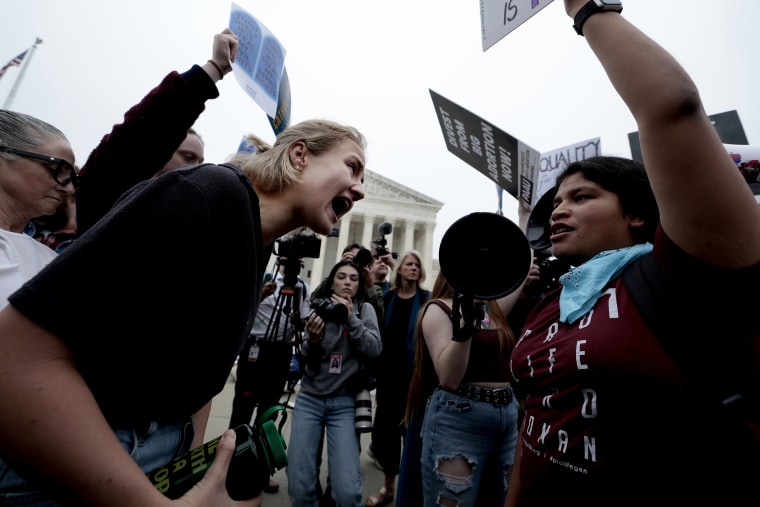Mayra Macias, the chief strategy officer at Building Back Together, was at dinner with her 21-year-old goddaughter when the draft Supreme Court opinion that would overturn Roe v. Wade was leaked.
"Her jaw dropped, and she said, 'What?!'" Macias said of her goddaughter. "The thought of not having access to abortion ... I think for her, it was definitely a wake-up call to start thinking about, again, how the courts and how Republicans and Congress and how our government really do have such a drastic impact on everyone’s day-to-day life."
Latino political consultants and those who organize voters said the latest news adds a new dynamic to their work mobilizing Hispanic voters.
The document, an early signal of where the court is heading, was leaked as Republicans are trying to capitalize on inroads that former President Donald Trump made with Latino voters, and Democrats are trying to win them back while preventing the GOP from chipping away more of its Latino voter base.
Macias’ organization was formed to promote the impact of laws passed during the Biden administration about issues from spending on infrastructure to expanding health care access to reproductive health.
She said the draft opinion gives Democrats the chance to show Latinos the contrast of their work with Republicans' determination to end Roe v. Wade.
In North Carolina, Irene Godinez has been organizing the growing Latino electorate ahead of the midterm elections through Poder NC Action, a progressive nonprofit group that she started in 2019.
Godinez, the group's director and founder, said the group has been addressing the issue of "reproductive justice" for the past year through civic education sessions dubbed "People Power School."
"Many of our members were shocked, because it was their first time learning about what states were doing to restrict abortions, about 'trigger laws,'" she said, referring to laws in 13 states that would ban all abortions if the Supreme Court officially strikes down Roe v. Wade.
The work became more urgent after the opinion was leaked Monday, she said.

In Miami, Andreina Kissane, the treasurer of the Venezuelan American Republican Alliance in Florida, said the organization has been very vocal about its opposition to abortion “at any stage of the pregnancy.” The group gathers in front of an abortion clinic in Miami every month to protest abortions.
The issue of abortion will “absolutely” galvanize Latino voters in November, she said, citing the many Latinos who are Catholic or of other Christian faiths.
“We strongly believe women have the liberty to choose what happens with their bodies,” Kissane said. “But in this instance, it is not their bodies. Another set of hands or feet constitute another human being.”
Latinos have long been stamped as being anti-abortion, but polls are finding that such a sweeping label does not apply.
Fernand Amandi, a Miami-based Democratic consultant and pollster, said his polling in the past few years shows a slight majority of Latinos believe abortion should be legal. Among those who felt it should be illegal, the vast majority said it should be legal when the woman’s health was at risk or when there were concerns about rape or incest.
“The Hispanic position is fascinating,” Amandi said. “Even though many have a personal belief, that does not extend to them wanting to see the choice taken away from other women.”
They also feel “the government should not be the arbiter of whether it’s legal or not.”
“Is it a nuanced position? It is. But I think what they’re fundamentally saying is, despite their own personal beliefs on whether or not they believe abortion should be legal or illegal, they are not willing to impose their personal beliefs on others, which would deny others the choice,” Amandi said.
Jason Villalba, the CEO and board chairman of the centrist Texas Hispanic Policy Foundation, said that in some areas Hispanic membership in evangelical churches has grown and that in those places the support for making abortion illegal is stronger.
However, Latina voters who are more suburban dwellers are likely to respond similarly to white women should abortion become illegal. They will find it troubling, said Villalba, who hosts “The Latino Vote Podcast.”

Texas Republican consultant Luke Macias disagreed. He said that Latino voters have been “pro life” for a long time and that abortion has been a contributing factor to moving Latinos to the GOP. The jolt of the draft opinion helps move the issue to the forefront, a plus for Republicans, Macias said.
There is likely to be a split between married and single Latinas, with married Latinas more opposed to legalizing abortion, he said.
He said the issue will fit in with the public school cultural issues agenda that is already gaining momentum among Latino Republicans about such issues as “pornography in schools” and the “sexualization of children.” Such terms have been used by conservatives waging campaigns against LGBTQ books, curriculums and rights in public schools.
Ingrid Duran, the founder of the progressive group PODER PAC, said the draft opinion, while it is unwelcome, may help elect candidates her political action committee has endorsed. The PAC endorses only candidates who support abortion rights.
One of them is Michelle Vallejo, a Democrat running for Congress in an open seat in Texas’ Rio Grande Valley, which is overwhelmingly Latino and often pointed to as more conservative. She made it to a runoff.
Also in a runoff, but not on the PODER PAC list, is Jessica Cisneros, who has attacked her fellow Democratic opponent, Rep. Henry Cuellar, for his conservative views on abortion.
“The focus is now on Congress, because Congress can make Roe v. Wade the law of the land by voting on it,” Duran said.
'Destigmatizing' beyond slogans
In North Carolina, Godinez said making headway with prospective voters about the need to support abortion access requires going beyond an email or a slogan.
At her group's People Power School, stories are shared about abortion, which has helped destigmatize abortions and create some common ground among Latinos who value family, she said.
Godinez, the mother of one, did that with her own family when she opened up about her abortion and how “it allowed me to go to college, have a career and, eventually, parent how I want.”
“Destigmatizing abortion and educating Latinos about it helps us make the connection to voters about what they can do to ensure those in the courts uphold the laws they care about,” she said.
Suzanne Gamboa reported from San Antonio, Nicole Acevedo from New York and Carmen Sesin from Miami.
Follow NBC Latino on Facebook, Twitter and Instagram.



